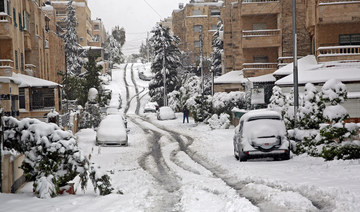BEIJING: Outside a funeral home in eastern Beijing, dozens of people were bundled up in parkas and hats against the freezing temperatures Friday evening as workers in full protective suits wheeled out coffins one by one.
When an employee with a clipboard shouted the name of the dead, a relative trundled up to the coffin to examine the body. One of the relatives said their loved one had been infected with COVID-19.
Deaths linked to the coronavirus are appearing in Beijing after weeks of China reporting no fatalities, even as the country is seeing a surge of cases.
That surge comes as the government last week dramatically eased some of the world’s strictest COVID-19 containment measures. On Wednesday, the government said it would stop reporting asymptomatic COVID-19 cases since they’ve become impossible to track with mass testing no longer required.
That halt in reporting made it unclear how fast the virus is spreading. Social media posts, business closures and other anecdotal evidence suggest huge numbers of infections.
It’s also unclear how many people are dying from the virus. An AP reporter who visited the Dongjiao Funeral home was told by relatives that at least two people cremated there had died after testing positive.
Health authorities had designated Dongjiao and one other funeral home to cremate those who die after testing positive, according to a relative of one of the dead. The woman said her elderly relative had fallen ill in early December, tested positive, and died Friday morning in an emergency ward.
She said there were lots of people in the emergency ward who had tested positive for COVID-19, adding that there weren’t enough nurses to take care of them. The woman did not want to be identified for fear of retribution.
Over about an hour, about a dozen bodies were wheeled from the Dongjiao funeral home.
About a half-dozen people inside described how another victim had struggled to breathe that morning before dying, and the death certificate listed “pneumonia” as the cause of death, even after a positive test for COVID-19, one of those people said. The people interviewed did not want to be identified for fear of retribution.
Three employees of shops in the complex that houses the funeral home said there had been a marked increase in the number of people going there in recent days. One estimated about 150 bodies were being cremated daily, up from what is normally a few dozen a day.
One employee attributed it to the coronavirus, although another said there are usually more deaths with the arrival of winter. The employees did not want to be identified for fear of retribution.
China has not reported a death from COVID-19 since Dec. 4.
China’s official death toll remains low, with just 5,235 deaths compared with 1.1 million in the United States. However, public health experts caution that such statistics can’t be directly compared.
Chinese health authorities count only those who died directly from COVID-19, excluding those whose underlying conditions were worsened by the virus. In many other countries, guidelines stipulate that any death where the coronavirus is a factor or contributor is counted as a COVID-19-related death.
Experts say this has been the longstanding practice in China, but questions have been raised at times about whether officials have sought to minimize the figures.
Also on Friday, China’s Cabinet ordered rural areas to prepare for the return of migrant workers this holiday season in hopes of preventing a big surge in COVID-19 cases in communities with limited medical resources.
Returnees must wear masks and avoid contact with elderly people, and village committees must monitor their movements, the guidelines said, but didn’t mention the possibility of isolation or quarantines.
There are fears of a surge in cases around China’s winter holidays, when tens of millions take to trains, buses and planes for what may be their only trip home all year.
The upcoming Lunar New Year falls on Jan. 22, but migrants generally begin heading home two weeks or more in advance. Some Chinese universities say they will allow students to finish the semester from home to help spread out the travel rush and reduce the potential for a bigger outbreak.
Medical resources in smaller cities and rural communities, which are home to about 500 million of China’s 1.4 billion people, lag far behind those of large cities such as Beijing and Shanghai. Rural medical infrastructure includes 17,000 county-level hospitals — many of which lack even a single ICU bed — 35,000 township health centers and 599,000 village clinics.
China has been pushing to increase the number of fever clinics in rural areas to treat those with COVID-19 symptoms. Currently, about 19,400 such clinics or consulting rooms operate in communities and townships around the country, state media reported Friday.
By March 2023, about 90 percent of health centers at the township level will have fever clinics, Nie Chunlei, head of primary health at the National Health Commission, said Thursday.
“This will effectively enhance the capability of primary-level health care institutions to receive patients with fever,” said Nie, who also urged stockpiling of medicines and antigen test kits, many of which have become scarce even in big cities.
The lifting of some travel regulations has spurred both relief and anxiety over the level of COVID-19 preparedness.
Health experts have said China will face a peak of infections in the next month or two and is trying to persuade reluctant seniors and others at risk to get vaccinated.
The changes follow growing frustration with the “zero-COVID” policy blamed for hindering the economy and creating massive social stress. The easing began in November, and accelerated after Beijing and several other cities saw protests over the restrictions that grew into calls for President Xi Jinping and the Communist Party to step down — a level of public dissent not seen in decades.
It’s unclear what prompted the government’s shift in policy. Experts cite economic pressure, public discontent, and the difficulties of containing the extremely infectious omicron variant as factors.
China wasn’t fully prepared for opening up from a public health standpoint, and the decision was driven mainly by economic and social factors, said Zeng Guang, a health expert formerly affiliated with China’s Center for Disease Control, speaking at a conference organized by the state-run Global Times newspaper.
Under the relaxed rules, obligatory testing is no longer required and people with mild symptoms are permitted to recover at home rather than go to a quarantine center. Meanwhile, the semi-autonomous gambling enclave of Macao will scrap its mandatory hotel quarantine for arrivals from Hong Kong, Taiwan and overseas starting Saturday, the government said.
However, travelers must spend five days in home isolation and undergo testing, and are barred from entering mainland China until the 10th day upon arrival. Both Macao and Hong Kong have scrapped most anti-COVID-19 measures.
Deaths linked to COVID-19 seen in Beijing after coronavirus rules eased
https://arab.news/n2bmx
Deaths linked to COVID-19 seen in Beijing after coronavirus rules eased
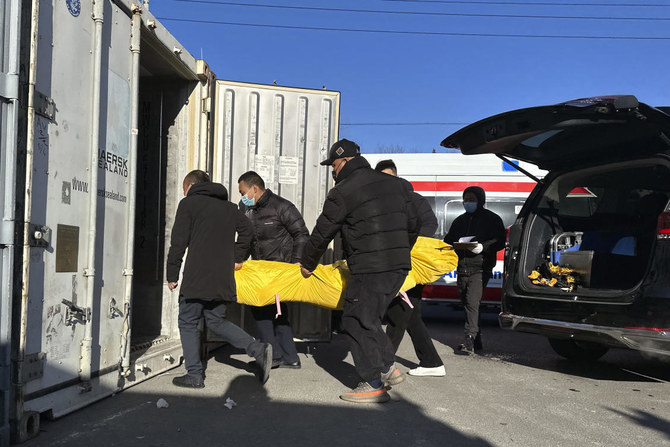
- China has not reported a COVID-19 death since Dec. 4
- There are fears of a surge in cases around China’s winter holidays
Germany failing to protect Muslims from hate: Human Rights Watch
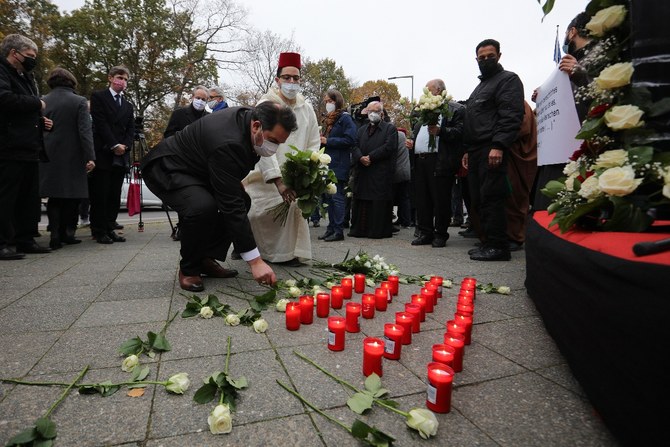
- Government ‘lacks understanding’ of racism targeting Muslim communities
- 2023 marked ‘frighteningly new high’ for hate incidents: German NGO chief
LONDON:Germany is failing to protect Muslims from growing racism amid a “lack of understanding” about the issue, Human Rights Watch has warned.
The country has yet to implement a working definition of anti-Muslim racism and frequently fails to record data on race-hate incidents, the organization said on Tuesday.
A key failing of the German government concerns its “lack of understanding that Muslims experience racism and not simply faith-based hostility,” said Almaz Teffera, a HRW researcher on racism in Europe.
“Without a clear understanding of anti-Muslim hate and discrimination in Germany, and strong data on incidents and community outreach, a response by the German authorities will be ineffective.”
Germany recorded 610 “anti-Islamic” crimes in 2022, but from the start of 2023 to September that year, the number had climbed to 686.
There are fears that the figure has further surged since the outbreak of the Gaza conflict last October.
Germany’s Interior Ministry told HRW that it could not provide data on anti-Muslim crimes from October 2023 to the year-end.
However, civil society groups in the country recorded a spike in reported incidents, leading Germany’s federal commissioner for anti-racism, Reem Alabali-Radovan, to join an EU-wide expression of concern about the rise in hate.
The Alliance Against Islamophobia and Anti-Muslim Hate, a German NGO network, documented “an average of three anti-Muslim incidents a day” last November.
The network’s chief, Rima Hanano, told HRW that “2023 marked a frighteningly new high for anti-Muslim incidents.”
Though the network collects its own internal data on the frequency of hate incidents, the German government “has yet to develop an infrastructure for countrywide monitoring and data collection,” HRW said.
The government has also classified hate incidents against Muslims as “anti-Islamic” since 2017, removing nuances surrounding the ethnic identities of victims, HRW added.
A three-year study commissioned by the government and published last year recommended that authorities “no longer dissociate anti-Muslim hate from racism,” but instead “recognize their connection.”
However, the Interior Ministry has failed to carry out the report’s recommendations, HRW said, adding: “Any focus on anti-Muslim hate and discrimination that fails to include racism or acknowledge the intersectional nature of such hostility will be unable to capture the full picture or inform effective policy responses.”
Muslim communities in Germany are a “group with a diversity of ethnicities” rather than a “monolithic religious group,” said Teffera.
“Germany should invest in protecting Muslims and all other minority communities in Germany because it is an investment in protecting all of German society.”
A gunman kills 6 worshippers inside a Shiite mosque in western Afghanistan, the Taliban say
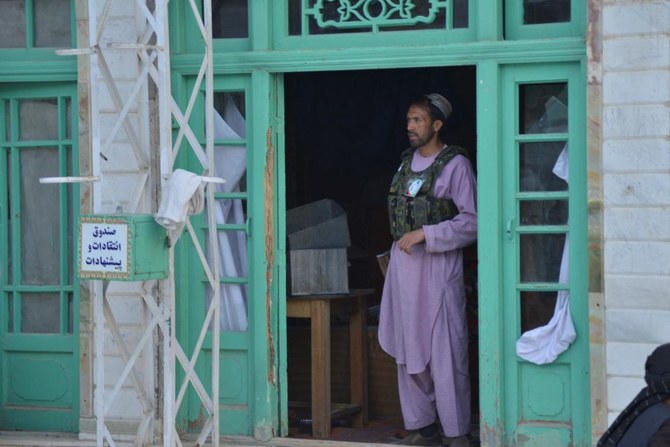
ISLAMABAD: A gunman stormed a mosque in western Afghanistan, opening fire and killing six people as they were praying, a Taliban official said Tuesday.
Local media reports and a former president of Afghanistan said the mosque was targeted because it was a place of worship for the country’s Shiite Muslim minority.
The attack happened on Monday night in the district of Guzara in Herat province, said Abdul Mateen Qani, a spokesman for the Taliban Interior Ministry. He said in a post on the social media platform X that an investigation was underway.
No one immediately claimed responsibility for the attack, which also wounded another worshipper while the attacker fled. Local media reported that the mosque's imam was among those killed.
“I strongly condemn the attack on the Imam Zaman Mosque,” former Afghan President Hamid Karzai said on X. “I consider this terrorist act against all religious and human standards.”
The United Nation Assistance Mission in Afghanistan also condemned the attack, which it said killed and wounded at least seven people, including a child. It called for urgent accountability for perpetrators and protection measures for Shitte communities.
The Islamic State group’s affiliate in Afghanistan is a major Taliban rival and frequently targets schools, hospitals, mosques and Shiite areas throughout the country.
The Taliban seized power in Afghanistan in August 2021, during the last weeks of the chaotic departure of U.S. and NATO troops from the country after 20 years of war.
Despite initial promises of a more moderate stance, the Taliban gradually reimposed a harsh interpretation of Islamic law, or Shariah, as they did during their previous rule of Afghanistan from 1996 to 2001.
Russia says United States is being hypocritical over ICC and Israel
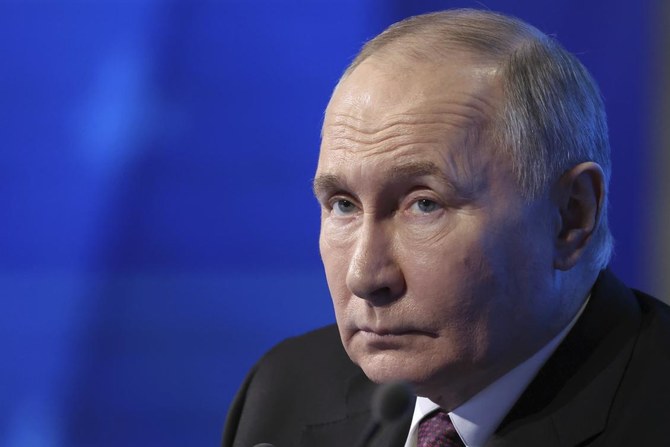
- US President Joe Biden said last year that the ICC decision to issue an arrest warrant for Putin was justified
MOSCOW: Russia said on Tuesday that the United States was being hypocritical by opposing the International Criminal Court’s (ICC) investigation of Israel but supporting the court’s warrant for the arrest of President Vladimir Putin.
The ICC — which can charge individuals with war crimes, crimes against humanity and genocide — is investigating Hamas’ Oct. 7 cross-border attack and Israel’s devastating military assault on Hamas-ruled Gaza, now in its seventh month.
White House spokesperson Karine Jean-Pierre said on Monday the United States did not support the ICC’s investigation of Israel and did not believe that the court had jurisdiction.
US President Joe Biden said last year that the ICC decision to issue an arrest warrant for Putin was justified. The United States has shared details of alleged Russian war crimes in Ukraine with the ICC.
Russia says the warrant against Putin is a meaningless attempt by the West to soil Russia’s reputation and denies war crimes in Ukraine. Ukraine says Russia committed war crimes. Russia says the West has ignored Ukraine’s crimes, a charge denied by Kyiv.
“Washington fully supported, if not stimulated, the issuance of ICC warrants against the Russian leadership,” Russian Foreign Ministry spokesperson Maria Zakharova said in a post on Telegram.
But “the American political system does not recognize the legitimacy of this structure in relation to itself and its satellites,” Zakharova said, adding that such a position was intellectually “absurd.”
The Kremlin has called the issuing of the warrant against Putin outrageous and legally void, as Russia is not a signatory to the treaty that created the ICC.
Israel is not a member of the ICC, while the Palestinian territories were admitted as a member state in 2015.
Prime Minister Benjamin Netanyahu said on Friday that any ICC decisions would not affect Israel’s actions but would set a dangerous precedent.
Israeli officials are worried that the court could issue arrest warrants against Netanyahu and other top officials for alleged violations of international humanitarian law in Gaza, Israeli media have reported.
They said the ICC is also considering arrest warrants for leaders from Hamas.
London police arrest sword-wielding man after reports of stabbing

- Police said the suspect had attacked members of the public and two officers
LONDON: British police have arrested a man armed with a sword following reports of people having been stabbed during a serious incident in northeast London although it was not thought to be terrorism-related, the capital’s police force said on Tuesday.
The 36-year old man was arrested after police were called to reports of a vehicle being driven into a house in the area close to Hainault train station, the Metropolitan Police said in a statement.
Police said the suspect had attacked members of the public and two officers.
“This must have been a terrifying incident for those concerned. I know the wider community will be feeling shock and alarm,” Metropolitan Police Deputy Assistant Commissioner Ade Adelekan said. “We do not believe there is any ongoing threat to the wider community.”
The force said the incident did not appear to be terror-related and they were not looking for further suspects.
“I am being regularly updated about the incident at Hainault Station this morning,” Britain’s interior minister James Cleverly said on X. “My thoughts are with those who have been affected.”
Gunman kills six in attack on Afghan mosque – Taliban spokesman
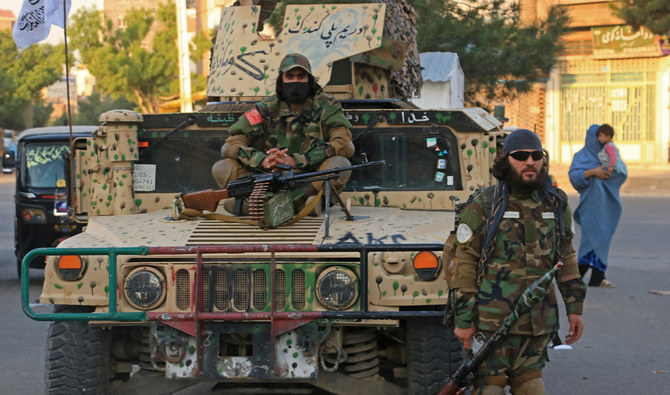
- Locals say the mosque served the minority Shiite community just south of the Afghan city of Herat
- While no group has claimed the attack, the regional chapter of Daesh is viewed as threat in Afghanistan
HERAT: A gunman stormed a mosque in western Afghanistan and killed six people, a government spokesman said Tuesday, with local residents claiming the minority Shiite community had been targeted.
Interior ministry spokesman Abdul Mateen Qani said that “an unknown armed person shot at civilian worshippers in a mosque” in Herat province’s Guzara district on Monday at around 9:00 p.m. (1630 GMT).
“Six civilians were martyred and one civilian was injured,” he wrote on social media platform X early Tuesday morning.
Locals said the mosque served the minority Shiite community in a district just south of the provincial capital of Herat city, and the imam and a three-year-old child were among those killed.
They also said a team of three gunmen staged the attack, contradicting the official account.
“One of them was outside and two of them came inside the mosque, shooting the worshippers,” said 60-year-old Ibrahim Akhlaqi, the brother of the slain imam. “It was in the middle of the prayers.”
“Whoever was in the mosque has either been martyred or wounded,” added 23-year-old Sayed Murtaza Hussaini.
While no group has claimed the attack, the regional chapter of Daesh is the largest security threat in Afghanistan and has frequently targeted Shiite communities.
The Taliban government has pledged to protect religious and ethnic minorities since returning to power in August 2021, but rights monitors say they’ve done little to make good on that promise.
The most notorious attack linked to Daesh since the Taliban takeover was in 2022, when at least 53 people — including 46 girls and young women — were slain in the suicide bombing of an education center.
Taliban officials blamed Daesh for the attack, which happened in a Shiite neighborhood of the capital Kabul.
Afghanistan’s new rulers claim to have ousted Daesh from the country and are highly sensitive to suggestions the group has found safe haven there since the withdrawal of foreign forces.
Taliban authorities have frequently given death tolls lower than other sources after bombings and gun attacks, or otherwise downplayed them, in an apparent attempt to minimize security threats.
A United Nations Security Council report released in January said there had been a decrease in Daesh attacks in Afghanistan because of “counter-terrorism efforts by the Taliban.”
But the report said Daesh still had “substantial” recruitment in the country and that the militant group had “the ability to project a threat into the region and beyond.”
Daesh chapter spanning Afghanistan, Pakistan and Central Asia claimed responsibility for the March attack on the Crocus City Hall concert venue in Moscow, killing more than 140 people.
It was the deadliest attack in Russia in two decades.










